
Archaeologies-Journal of the World Archaeological Congress
Scope & Guideline
Decoding the Past for a Better Tomorrow
Introduction
Aims and Scopes
- Community and Public Archaeology:
The journal emphasizes the role of archaeology in community engagement and public discourse, highlighting projects that involve local populations and address their needs, such as heritage revitalization and education. - Decolonial and Postcolonial Perspectives:
A core focus is on decolonizing archaeology and understanding the implications of colonial histories on present practices. This includes discussions on indigenous rights, ownership of heritage, and the politics of archaeological interpretation. - Interdisciplinary Approaches:
The journal showcases research that intersects archaeology with other disciplines, including history, anthropology, and sociology, to provide a more comprehensive understanding of cultural heritage and human experiences. - Technological Innovations in Archaeology:
There is a strong interest in the application of technology in archaeology, such as GIS, digital heritage, and 3D modeling, which enhance archaeological research and accessibility to wider audiences. - Social Justice and Intersectionality:
The journal promotes discussions on social justice issues within archaeology, focusing on how intersectionality can inform archaeological practice and research, particularly concerning marginalized communities.
Trending and Emerging
- Public Engagement and Heritage Activism:
There is an increasing trend towards public archaeology that emphasizes community involvement and activism, focusing on how archaeology can serve modern social needs and contribute to heritage discussions. - Environmental and Climate Archaeology:
Emerging themes include the integration of environmental concerns and climate change impacts on archaeological sites, reflecting a growing awareness of the relationship between past human activities and current environmental challenges. - Cultural Heritage and Identity:
The exploration of identity through the lens of cultural heritage is gaining traction, with a focus on how archaeological practices can affirm and reconstruct community identities, particularly for marginalized groups. - Digital Archaeology and Data Governance:
An upward trend is evident in the use of digital tools and methodologies in archaeology, particularly concerning data ownership, digital heritage, and the implications of new technologies for archaeological research. - Intersectionality in Archaeology:
The application of intersectionality as a framework in archaeological research is becoming more prominent, encouraging scholars to explore how various social categories (race, gender, class) intersect in the context of archaeological practice.
Declining or Waning
- Traditional Archaeological Methodologies:
There appears to be a decline in papers focused solely on traditional archaeological methods, such as excavation techniques and site surveys, as the journal increasingly prioritizes innovative and participatory approaches. - Eurocentric Archaeological Narratives:
The journal seems to be moving away from Eurocentric perspectives in archaeology, as evidenced by fewer publications centered solely on European archaeological contexts and a greater emphasis on global and inclusive narratives. - Historical Archaeology Focus:
There is a noticeable decline in the volume of articles specifically dedicated to historical archaeology, particularly those that do not address contemporary social issues or engage with modern communities.
Similar Journals
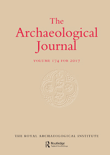
Archaeological Journal
Illuminating the Past, Inspiring Future GenerationsArchaeological Journal, published by Taylor & Francis Ltd, stands as a leading voice in the field of archaeology, with a remarkable distinction in the Q1 category for both arts and humanities as well as conservation, underscoring its critical role in advancing scholarly dialogue and research. With an ISSN of 0066-5983 and E-ISSN of 2373-2288, this journal provides a platform for innovative research from 1977, now offering insights up to 2024. The United Kingdom-based journal is highly regarded, being within the top 81st percentile in archaeology and conservation according to Scopus rankings. Essential for researchers, professionals, and students, the journal's content spans rigorous archaeological studies, theoretical advancements, and discussions on conservation practices, ultimately aimed at fostering a deeper understanding of humanity's past. Notably, with no open access option, it maintains a traditional publishing approach, thereby ensuring curated and high-quality contributions to the academic community.
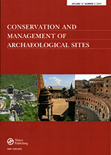
Conservation and Management of Archaeological Sites
Exploring Innovative Strategies for Site Management.Conservation and Management of Archaeological Sites is a pivotal academic journal published by Routledge Journals, Taylor & Francis Ltd, focusing on the interdisciplinary fields of archaeology and conservation. With an ISSN of 1350-5033 and an E-ISSN of 1753-5522, this journal strives to publish high-quality research that addresses critical topics related to the conservation and management of archaeological sites, fostering dialogue between practitioners, researchers, and policymakers. Despite being categorized in the third quartile (Q3) across multiple relevant categories such as Archaeology and Conservation in the 2023 rankings, it remains a significant resource for professionals seeking to enhance their understanding and application of best practices in site management. The journal plays a crucial role in disseminating knowledge that contributes to the preservation of cultural heritage, making it an essential read for anyone involved in these vital fields. Published since 1995, the journal not only reflects the growing importance of archaeology in today's society but also provides a platform for emerging research that will shape future conservation strategies.
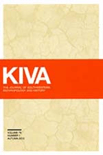
Kiva-Journal of Southwestern Anthropology and History
Advancing Knowledge in Anthropology and HistoryKiva - Journal of Southwestern Anthropology and History is a distinguished academic journal published by Routledge Journals, Taylor & Francis Ltd, that serves as a vital resource for scholars in the fields of anthropology, archaeology, and history. With an ISSN of 0023-1940 and an E-ISSN of 2051-6177, this journal has established itself as a significant avenue for scholarly communication since its inception in 1964. It consistently ranks in the top quartiles, including Q1 in Archaeology and Q2 in Anthropology, reflecting its high impact and rigorous peer-review process. Covering a wide array of topics pertinent to the Southwestern United States, Kiva invites original research articles, reviews, and methodological papers that advance understanding of the region's rich cultural heritage and historical narratives. While currently not open access, its commitment to disseminating quality research makes it an essential reading for researchers, professionals, and students aiming to explore the multifaceted dimensions of southwestern studies.
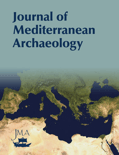
Journal of Mediterranean Archaeology
Advancing Knowledge in Mediterranean ArchaeologyThe Journal of Mediterranean Archaeology, published by EQUINOX PUBLISHING LTD in the United Kingdom, is a premier academic journal dedicated to the exploration and dissemination of knowledge within the vibrant field of Mediterranean archaeology. Established in 1988, this journal has consistently demonstrated its commitment to scholarly excellence, attaining a Q1 ranking in various categories, including Archaeology and Arts and Humanities, making it a vital resource for researchers and students alike. With a prominent Scopus rank of #49 out of 413 in Archaeology, it places itself among the top-tier publications, reflecting its impact and relevance in contemporary archaeological discourse. Although the journal is not open access, its rigorous peer-review process ensures the publication of high-quality scholarly articles that contribute significantly to the understanding of the diverse cultural narratives within the Mediterranean region. As the journal moves toward its 35th anniversary, it continues to be a cornerstone for professionals seeking to share groundbreaking research and dialogue in this critically important area of study.
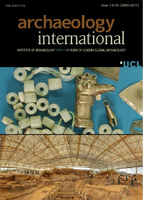
Archaeology International
Exploring the past to illuminate the future of archaeology.Archaeology International is a prestigious open-access journal dedicated to advancing the field of archaeology since its inception in 1997. Published by UCL PRESS, the journal provides a platform for researchers, professionals, and students to disseminate their findings and share innovative ideas in archaeological studies. It features a rich array of articles that capture current trends, methodologies, and debates within the discipline, fostering a collaborative academic environment. Based in London, England, this journal is committed to accessibility and inclusivity, ensuring that valuable research is available to a global audience without subscription barriers. With a focus on interdisciplinary approaches, Archaeology International serves as an essential resource for those interested in the preservation of cultural heritage, and it actively encourages contributions that explore both past civilizations and contemporary archaeological practices.
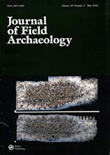
JOURNAL OF FIELD ARCHAEOLOGY
Advancing Discoveries, Connecting Past and PresentJOURNAL OF FIELD ARCHAEOLOGY, published by Routledge Journals, Taylor & Francis Ltd, is a premier scholarly publication dedicated to advancing the field of archaeology. With an impressive impact factor reflecting its significant contributions to both the arts and humanities, this journal ranks in the Q1 category for archaeology, with a remarkable position of #21/413 in the arts and humanities realm and #19/354 in social sciences, placing it in the 95th percentile among its peers. Catering to researchers, professionals, and students alike, the journal has continuously explored critical archaeological questions since its inception in 1974, with a commitment to disseminating high-quality research and innovative methodologies up to the present. Although it operates under a traditional access model, the journal engages a broad readership with its insightful studies and findings, making it an essential resource for anyone deeply involved in archaeology and its related disciplines.

Conimbriga-Revista de Arqueologia
Fostering Collaboration in the World of Archaeological InquiryConimbriga-Revista de Arqueologia is a distinguished open-access journal dedicated to the field of archaeology, published by COIMBRA UNIVERSITY PRESS. Since its inception, the journal has fostered a vibrant intellectual community focused on the exploration and dissemination of archaeological research, particularly emphasizing studies relevant to the rich historical and cultural heritage of Portugal and beyond. With its open access model established in 2014, it has become a vital resource for researchers, professionals, and students to share their findings without access barriers, encouraging collaboration and knowledge exchange. Despite the absence of specific metrics such as the HIndex and Scopus rankings, the journal is recognized for its commitment to high-quality scholarship and its role in advancing archaeological discourse. Positioned within the scholarly landscape, Conimbriga-Revista de Arqueologia serves as a crucial platform for the publication of innovative research, reviews, and critical essays, making it an essential journal for those invested in the archaeological sciences.

Archeologicke Rozhledy
Exploring the depths of history with open-access insights.Archeologicke Rozhledy, published by the Academy of Sciences of the Czech Republic, Institute of Archaeology, is a pivotal open-access journal dedicated to advancing the field of archaeology. Since transitioning to open access in 2019, it has made significant strides in disseminating high-quality research, serving as a vital resource for researchers, professionals, and students alike. With an ISSN of 0323-1267, the journal has gained recognition for its contributions in the domains of arts and humanities, particularly archaeology, as evidenced by its 2023 Q2 ranking in both categories. Operating out of the historical city of Prague, the journal encompasses a broad scope of archaeological scholarship, reflecting a commitment to interdisciplinary approaches and fostering dialogue within the global archaeological community. With its notable Scopus rankings—#115/413 in Arts and Humanities and #113/354 in Social Sciences—Archeologicke Rozhledy stands as a crucial outlet for innovative research and scholarly exchange.

ANTIQUITY
Bridging the Past and Present Through Scholarly DiscourseANTIQUITY is a prestigious academic journal published by Cambridge University Press that has been at the forefront of archaeological and humanities scholarship since its inception in 1927. With its roots firmly planted in the United Kingdom, the journal has achieved remarkable recognition, maintaining a Q1 ranking in both the fields of Archaeology and Arts and Humanities as of 2023. With an impressive Scopus ranking of #3 out of 173 in General Arts and Humanities and #28 out of 354 in Archaeology, it underscores its significant impact and influence in shaping contemporary discourse in these domains. Although it is not an Open Access journal, ANTIQUITY provides crucial insights into the evolution of human societies through a comprehensive range of archaeological studies, reviews, and theoretical discussions. By facilitating knowledge exchange among researchers, professionals, and students, ANTIQUITY not only enriches academic literature but also fosters a deeper understanding of our past.

Mediterranean Archaeology & Archaeometry
Exploring the Depths of Mediterranean HeritageMediterranean Archaeology & Archaeometry is a premier academic journal dedicated to advancing the fields of archaeology, anthropology, conservation, and history, published by UK Zhende Publishing Ltd. With its ISSN 1108-9628 and E-ISSN 2241-8121, this journal serves as a vital platform for scholars and practitioners to disseminate innovative research and findings related to the rich archaeological heritage of the Mediterranean region. It has gained remarkable recognition, achieving a Q2 ranking in anthropology and archaeology, and a Q1 classification in several categories including arts and humanities, conservation, and history as of 2023. Its impressive Scopus rankings underscore its impact, with a significant position in history (59/1760) and conservation (11/103) disciplines. Spanning years from 2008 to 2022, the journal invites open access contributions to foster collaboration and interdisciplinary dialogue among researchers, students, and professionals alike, making it an indispensable resource for those engaged in the exploration and preservation of historical narratives within the Mediterranean context.